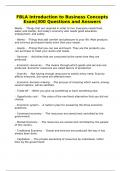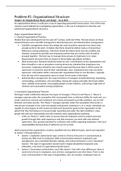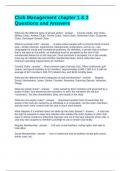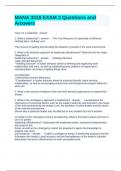FBLA Introduction to Business Concepts
Exam|300 Questions and Answers
Needs - -Things that are required in order to live. Everyone needs food,
water and shelter, but today's economy also needs good education,
employment, and safety.
- Wants - -Things that add comfort and pleasure to your life. Most products
and services purchased meets more than your needs.
- Goods - -Things that you can see and touch. They are the products you
can purchase to meet your wants and needs.
- Services - -Activities that are consumed at the same time they are
produced.
- Economic resources - -The means through which goods and services are
produced. Economic resources are called factors of production.
- Scarcity - -Not having enough resources to satisfy every need. Scarcity
affects everyone, but some are affected more.
- Economic decision making - -The process of choosing which wants, among
several options, will be satisfied.
- Trade-off - -When you give up something to have something else.
- Opportunity cost - -The value of the next-best alternative that you did not
choose.
- Economic system - -A nation's plan for answering the three economic
questions.
- Command economy - -The resources are owned and controlled by the
government.
- Market Economy - -The resources are owned and controlled by the people
of the country.
- Traditional Economy - -Goods and services are produced the way it has
always been done.
- Capitalism - -The private ownership of resources by individuals, rather
than by the government.
,- Consumer - -A person who buys and uses goods and services.
- Producers - -Individuals and organizations that determine what products
and services will be available for sale.
- Demand - -The quantity of a good or service the consumers are willing and
able to buy.
- Supply - -Refers to the quantity of a good or service that businesses are
willing and able to provide.
- Market Price - -The point where supply and demand are equal.
- Gross Domestic Product(GDP) - -It is the most widely used measure. GDP
is the total dollar value of all final goods and services produced in a country
during one year.
- GDP per capita - -Output per person. GDP per capita is calculated by
dividing GDP by the total population, this shows how much money each
person is expected to bring into the economy.
- Unemployment rate - -One economic statistic of concern. The
unemployment rate is the portion of people who can work, but are not
working.
- Productivity - -A vital source of economic growth is an increase in output
per worker. Productivity is the production output in relation to a unit of input,
such as a worker.
- Personal income - -Refers to salaries and wages as well as investment
income and government payments to individuals.
- Retail sales - -Is measured on a monthly basis by the U.S. Department of
Commerce. It tracks the sales of durable and nondurable goods bought by
consumers.
- Business Cycle - -The movement of the economy from one condition to
another and back again. They are the recurring ups and downs of GDP.
- Prosperity - -A period in which most people who want to work are working.
- Recession - -A period in which demand begins to decrease, businesses
lower production, unemployment begins to rise, and GDP growth slows for
two or more quarters of the calendar year.
, - Depression - -A phase marked by a prolonged period of high
unemployment, weak consumer sales, and business failures.
- Recovery - -The phase in which unemployment begins to decrease,
demand for goods and services increases, and GDP begins to rise again
- Inflation - -An increase in the general level of prices. During this time,
more money is required to buy the same amount of goods and services.
- Price Index - -A number that compares prices in one year with prices in
some earlier base years. There are different types of price indexes. The most
watched measures of inflation is called Consumer Price Index(CPI)
- Deflation - -A decrease in the general level of prices. It usually occurs in
periods of recession and depression.
- Capital projects - -Involve spending by businesses for items such as land,
buildings, equipment, and new products.
- Stock - -Represents ownership in a corporation. Stop ownership is
commonly called equity.
- Bond - -Represents debt for an organization. If you purchase a corporate
of government bond, you are a creditor.
- Budget Surplus - -When a government may spend less than it takes in. if a
surplus exists, government may reduce taxes or increase spending on
various programs.
- Budget Deficit - -When a government spends more than it takes in. Over
time, deficits build up.
- National Debt - -The total amount owed by the federal government.
- Imports - -Items bought from other countries. Without foreign trade, many
things you buy would cost more or not be available.
- Exports: - -Goods and services sold to other countries.
- Balance of trade: - -The difference between a country's total exports and
total imports;
- The Balance of Payments - -The difference between the amount of money
that comes into a country and the amount that goes out of it.
Exam|300 Questions and Answers
Needs - -Things that are required in order to live. Everyone needs food,
water and shelter, but today's economy also needs good education,
employment, and safety.
- Wants - -Things that add comfort and pleasure to your life. Most products
and services purchased meets more than your needs.
- Goods - -Things that you can see and touch. They are the products you
can purchase to meet your wants and needs.
- Services - -Activities that are consumed at the same time they are
produced.
- Economic resources - -The means through which goods and services are
produced. Economic resources are called factors of production.
- Scarcity - -Not having enough resources to satisfy every need. Scarcity
affects everyone, but some are affected more.
- Economic decision making - -The process of choosing which wants, among
several options, will be satisfied.
- Trade-off - -When you give up something to have something else.
- Opportunity cost - -The value of the next-best alternative that you did not
choose.
- Economic system - -A nation's plan for answering the three economic
questions.
- Command economy - -The resources are owned and controlled by the
government.
- Market Economy - -The resources are owned and controlled by the people
of the country.
- Traditional Economy - -Goods and services are produced the way it has
always been done.
- Capitalism - -The private ownership of resources by individuals, rather
than by the government.
,- Consumer - -A person who buys and uses goods and services.
- Producers - -Individuals and organizations that determine what products
and services will be available for sale.
- Demand - -The quantity of a good or service the consumers are willing and
able to buy.
- Supply - -Refers to the quantity of a good or service that businesses are
willing and able to provide.
- Market Price - -The point where supply and demand are equal.
- Gross Domestic Product(GDP) - -It is the most widely used measure. GDP
is the total dollar value of all final goods and services produced in a country
during one year.
- GDP per capita - -Output per person. GDP per capita is calculated by
dividing GDP by the total population, this shows how much money each
person is expected to bring into the economy.
- Unemployment rate - -One economic statistic of concern. The
unemployment rate is the portion of people who can work, but are not
working.
- Productivity - -A vital source of economic growth is an increase in output
per worker. Productivity is the production output in relation to a unit of input,
such as a worker.
- Personal income - -Refers to salaries and wages as well as investment
income and government payments to individuals.
- Retail sales - -Is measured on a monthly basis by the U.S. Department of
Commerce. It tracks the sales of durable and nondurable goods bought by
consumers.
- Business Cycle - -The movement of the economy from one condition to
another and back again. They are the recurring ups and downs of GDP.
- Prosperity - -A period in which most people who want to work are working.
- Recession - -A period in which demand begins to decrease, businesses
lower production, unemployment begins to rise, and GDP growth slows for
two or more quarters of the calendar year.
, - Depression - -A phase marked by a prolonged period of high
unemployment, weak consumer sales, and business failures.
- Recovery - -The phase in which unemployment begins to decrease,
demand for goods and services increases, and GDP begins to rise again
- Inflation - -An increase in the general level of prices. During this time,
more money is required to buy the same amount of goods and services.
- Price Index - -A number that compares prices in one year with prices in
some earlier base years. There are different types of price indexes. The most
watched measures of inflation is called Consumer Price Index(CPI)
- Deflation - -A decrease in the general level of prices. It usually occurs in
periods of recession and depression.
- Capital projects - -Involve spending by businesses for items such as land,
buildings, equipment, and new products.
- Stock - -Represents ownership in a corporation. Stop ownership is
commonly called equity.
- Bond - -Represents debt for an organization. If you purchase a corporate
of government bond, you are a creditor.
- Budget Surplus - -When a government may spend less than it takes in. if a
surplus exists, government may reduce taxes or increase spending on
various programs.
- Budget Deficit - -When a government spends more than it takes in. Over
time, deficits build up.
- National Debt - -The total amount owed by the federal government.
- Imports - -Items bought from other countries. Without foreign trade, many
things you buy would cost more or not be available.
- Exports: - -Goods and services sold to other countries.
- Balance of trade: - -The difference between a country's total exports and
total imports;
- The Balance of Payments - -The difference between the amount of money
that comes into a country and the amount that goes out of it.






